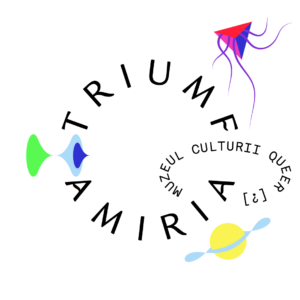
TRIUMF AMIRIA. The Queer Culture Museum [?] is a project aimed at recovering queer cultural production from the past 20 years, focusing on three main areas: literature, visual arts, and performing arts. TRIUMF AMIRIA is an extensive effort to disseminate local queer culture while also seeking to identify multiple directions for the future of queer cultural production.
The project proposes a series of events intended to highlight the importance of queer culture in the past two decades and to encourage new cultural production through exhibitions, workshops, guided tours, theater performances, readings, and networking events. These public activities are accompanied by research and digital archiving of cultural artifacts created by queer artists from 2001 to the present.
An explanation for the museum’s unusual name is provided by Mihaela Cîrjan, the museum coordinator: “An authentic queer name that emerged in the laboratories of the artistic collective Apparatus 22, TRIUMF AMIRIA alludes to the feeling of pride, the pride celebrated annually by queer communities around the world, but it also encapsulates a broader vision of the role of a queer museum. A-mi-ri-a because it tends towards infinity, towards utopia. We recover ‘miria’ from the Greek ‘mýrioi,’ used in the 18th and 19th centuries (later forgotten) as a decimal prefix in the metric system to symbolize ten thousand. It is a necessary gesture to represent our queer identities, fluid and multiplied ten thousand times and ten times over, in an ideal world where queerness allows space for all of us, in virtue of our humanity.”
TRIUMF AMIRIA. The Queer Culture Museum [?] is a project realized by MozaiQ Association in partnership with National Contemporary Arts Museum, The Educational Theatre Centre “Replika” and the artist Kjertsi Vetterstad from Norway.
This project unfolded between March 2020 – March 2022.
The project’s total budget was 1.057.556 RON, of which the value of the non-redundable financial support was 951.800 RON.
The project was financed through the EEA Grants 2014-2021 through the RO-CULTURA Program.
The EEA Grants represent the contribution of Iceland, Lichtenstein and Norway for reducing the economical and social disparities in the European Economical Area and through the consolidation of the bilateral relationshops with the 15 beneficiaries states from Easter and Southern Europe, as well as the Baltic States. These granting mechanisms were established on the basis of the EEA Accord, which reunites the EU member states and Iceland, Lichtenstein and Norway as equal partners on the market.
In total, the three states have contributed with 3,3 billion euros between 1994 and 2014, and 1,55 billion euros for the granting period of 2014-2021. More details are available at: www.eeagrants.org and www.eeagrants.ro
The RO-CULTURA Program was implemented by the Ministry of Culture through the Project Management Unit and had the general purpose of socio-economical development through cultural cooperation, cultural entrepreneurship and management of the cultural heritage.
The Program’s budget was approximately 34 million euros.
You can find more details at pe www.ro-cultura.ro
